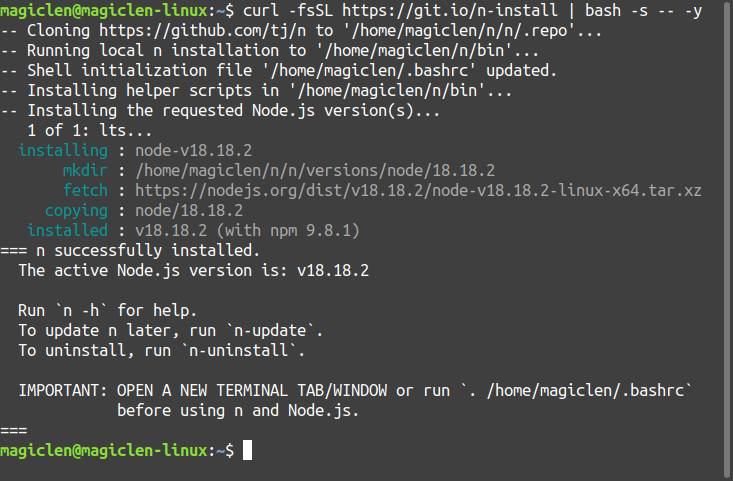

- Linux install nodejs how to#
- Linux install nodejs update#
- Linux install nodejs code#
- Linux install nodejs download#
Linux install nodejs how to#
Here we will show you how to install Node.js and Node Package Manager (NPM) on your server. Modern-day, it is straightforward and easy to set up though it can still be intimidating. Among the other amazing features that Node.js has jam-packed into itself, it is a popular choice for websites to use.
Linux install nodejs code#
Node.js is a lightweight and seemingly efficient JavaScript runtime that can be used to run JavaScript code outside of the browser. Make sure Homebrew has the latest version of the Node package.Along with the many technologies out there, such as Ruby, Python, and PHP, you may have heard of one called Node.js.

Linux install nodejs update#
You can use Homebrew to update the software it installs. New versions of Node and NPM come out frequently. This should print the version number so you’ll see something like this 2.1.17 To see if NPM is installed, type npm -v in Terminal. This should print the version number so you’ll see something like this v0.10.35. To see if Node.js is installed, type node -v in Terminal. Make sure you have Node and NPM installed by running simple commands to see what version of each is installed:
Linux install nodejs download#
Homebrew has to download some files, compile and install them. Open up your terminal and type brew install node.

The whole process (after you have Linuxbrew installed) should only take you a few minutes. It handles downloading, unpacking, compiling and installing Node and NPM on your system. Installing Node.js® and NPM is pretty straightforward using Linuxbrew, the Linux port of Homebrew. zshrc file the following 3 lines:Įxport MANPATH="$HOME/.linuxbrew/share/man:$MANPATH"Įxport INFOPATH="$HOME/.linuxbrew/share/info:$INFOPATH" Follow the instructions in the terminal to complete the installation process. To install Homebrew for Linux open your terminal application and paste in the command ruby -e "$(curl -fsSL )". You can learn more about Homebrew at the Homebrew website and Linuxbrew at the Linuxbrew website. Homebrew is a package manager originally for the Mac but has been ported to Linux – Linuxbrew – it makes installing most open source software (like Node) as simple as writing brew install node. For Fedora based Linux distributions run the following command in your terminal application sudo yum groupinstall 'Development Tools' & sudo yum install curl git m4 ruby texinfo bzip2-devel curl-devel expat-devel ncurses-devel zlib-develand select Y to continue and wait for the packages to be installed.For Ubuntu or Debian based Linux distributions run the following command in your terminal sudo apt-get install build-essential curl git m4 ruby texinfo libbz2-dev libcurl4-openssl-dev libexpat-dev libncurses-dev zlib1g-dev and select Y to continue and wait for the packages to be installed.You’ll need Ruby 1.8.6 or newer and GCC 4.2 or newer. You need to install a number of dependancies before you can install Node.js and NPM. You’ll also need the terminal to use Node.js and NPM. You should have some familiarity with the Linux terminal since you’ll need to use it to install and test Node and NPM.NPM is installed when you install Node.js® Prerequisites

For example, the “request” package simplifies the process of making HTTP request so you can easily get web resources from other sites. A package is just a code library that extends Node by adding useful features. NPM is a “package manager” that makes installing Node “packages” fast and easy. You can also use it to perform helpful tasks on your computer such as concatenating and minifying JavaScript files and compiling Sass files into CSS. Node.js® is a JavaScript-based environment which you can use to create web-servers and networked applications. Installing Node.js® and NPM on Linux What’s Node.js® and NPM?


 0 kommentar(er)
0 kommentar(er)
